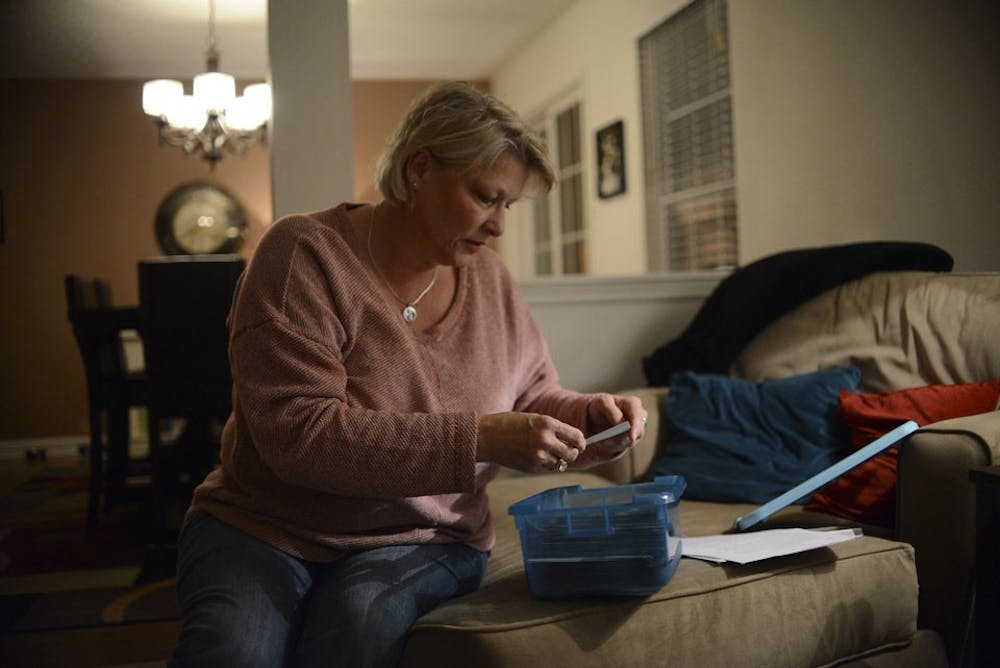Robin Wilson said she couldn’t handle any more surprises. She couldn’t stand to see or hear anything she hadn’t already. She was sitting in a courtroom across from her daughter’s killer and knew she owed it to Hannah to stay strong.
To an outsider, it seemed Robin had no emotion because she didn’t show it. She was calm and composed. She kept a straight face to avoid any chance at an unfair trial because sitting through this one time was already too many.
But 17 months after Robin’s daughter, 22-year-old IU senior Hannah Wilson, was murdered, it took every fiber of her being not to break down, she said.
On day three of the trial, the prosecutor pulled a blood-soaked shirt out of a bag. What was once light grey fabric was now colored burgundy.
Because all evidence remained concealed during the investigation, Robin hadn’t yet seen the clothes Hannah died in. She tilted her head down, tried to fight back tears and kept it together the best she could because she had to.
“You had to, for your child who could no longer speak for herself,” she said.
***
Hannah was someone who didn’t want to believe people like Daniel Messel existed in this world, Robin said. She always found the good.
On the night of April 24, 2015, Hannah was abducted from her Bloomington home. A woman found her body in an grassy clearing in Brown County the next morning, with a cell phone lying near her feet. That piece of evidence led detectives to Messel, who was arrested and charged with murder.
Relief flooded the courtroom last month when Messel was convicted of murder. Relief — that was the best word to use, Robin said, not happiness. She couldn’t be happy when Hannah was never coming back.
Robin’s questions about that night might never be answered. How did Messel lure Hannah into his car? Was he planning to murder her? More than anything, why her daughter? But now, with Hannah’s killer behind bars, her loved ones are trying to move forward and celebrate her life.
Hannah was the girl who truly lived life to the fullest, said Ashley Harding, one of Hannah’s best friends and roommates. She was the girl everyone wanted to be friends with. All the younger members of Gamma Phi Beta looked up to her, and all the seniors thought she was the coolest. She was honest and encouraging. She didn’t criticize others for their imperfections but embraced them.
“If she wasn’t laughing, she was making you laugh,” Harding said.
Today, the subtlest things remind her of Hannah, and they always come right when she needs it, Harding said. When she’s cooking ramen noodles, she said she thinks of Hannah, who made ramen and salsa almost every night for dinner. When she sees a Kohl’s commercial, she thinks of Hannah, who worked there.
When Harding hears one of their favorite songs on the radio, she knows Hannah is there with her.
Several friends who saw Hannah on her last day testified in front of a jury last month. While they waited to be called to the stand, some peeked through the back window of the courtroom to see Messel.
Alli Eschbach, a sorority sister and roommate, wouldn’t do it — not until she took the stand and had to.
The eyes staring back at her were lifeless, she remembers. They were dark and empty. There was no sign of remorse or regret, and she struggled to comprehend what kind of person could do what he did.
Now Eschbach couldn’t stop looking at him.
“Staring at him, I was hoping I’d get answers,” she said. “But I didn’t.”
***
Eschbach is reminded of her best friend anytime she glances down at her wrist. As soon as she returned home after the trial, she got a tattoo dedicated to Hannah.
It’s a dash. It symbolizes all the days between the day of your birth and day of your death, and it comes from a poem Eschbach has loved for years and shared with other members of Gamma Phi.
The poem epitomizes Hannah, who lived every day to the fullest, Eschbach said. It reminds her that none of us are promised tomorrow. In the poem, a man stands up at a funeral to give a eulogy:
He noted that first came the date of birth
and spoke the following date with tears,
but he said what mattered most of all
was the dash between those years.
On the day of the verdict, about a week after their testimonies, Harding and Eschbach lay on a beach in North Carolina, their minds still fixed on the trial. They constantly checked their phones for updates.
“I remember Al grabbed me and said the verdict was in,” Harding said.
When Eschbach read the guilty verdict out loud, they screamed and held each other and cried. #JusticeforHannah spread across social media. Those who knew Hannah believe that in her last struggle she made sure no one else would have to suffer the way she did.
Seventeen months later, Eschbach said she still hasn’t fully processed what happened that weekend in April 2015.
She hasn’t moved on, but she’s trying to move forward.
***
Robin Wilson used to send Hannah a bouquet of gerbera daisies to tell her she was thinking of her.
“Hannah always said, ‘Nobody could be sad looking at a gerbera daisy.’”
Now, the flower is a reminder Hannah is still with her, Robin said. She sees signs of Hannah everywhere she goes. Like the day Robin was in Chicago and a skyscraper happened to be lit up purple and green, Hannah’s favorite colors. Sometimes those moments take Robin’s breath away, and a tear will run down her face. She’ll take just a minute to be with her daughter before going on with her day because that’s what Hannah would’ve wanted.
On the Monday before Messel’s sentencing, Robin sat outside with a friend enjoying a beautiful day. A monarch butterfly flew overhead, then back and forth at least half a dozen times.
“Hannah loved butterflies, and you don’t see monarchs often,” Robin said. “That loved one is still surrounding you — you just have to be open to knowing they are there.”
So she stops to say hi to Hannah, and then life goes on.




